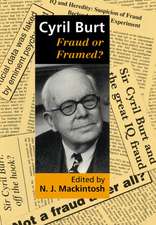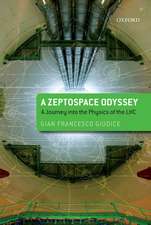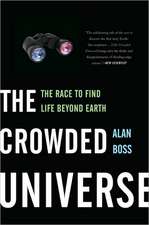Universal Life: An Inside Look Behind the Race to Discover Life Beyond Earth
Autor Alan Bossen Limba Engleză Hardback – 25 apr 2019
Preț: 254.11 lei
Preț vechi: 281.28 lei
-10% Nou
Puncte Express: 381
Preț estimativ în valută:
48.62€ • 51.04$ • 40.36£
48.62€ • 51.04$ • 40.36£
Carte disponibilă
Livrare economică 10-15 martie
Preluare comenzi: 021 569.72.76
Specificații
ISBN-13: 9780190864057
ISBN-10: 0190864052
Pagini: 228
Ilustrații: 17 color halftones, 7 b/w halftones, and 6 line art
Dimensiuni: 163 x 241 x 20 mm
Greutate: 0.45 kg
Editura: Oxford University Press
Colecția OUP USA
Locul publicării:New York, United States
ISBN-10: 0190864052
Pagini: 228
Ilustrații: 17 color halftones, 7 b/w halftones, and 6 line art
Dimensiuni: 163 x 241 x 20 mm
Greutate: 0.45 kg
Editura: Oxford University Press
Colecția OUP USA
Locul publicării:New York, United States
Recenzii
If you've ever wanted to understand why space missions take decades to be realised, with some science highlights scattered in between, then give Boss's latest book a go. It's a page-turner that is worthy of multiple rereads.
Boss gives a comprehensive view of Kepler's origins and contributions to our knowledge of possible life in the great beyond ... The book is packed with the budget woes and scientific celebrations that make up life at NASA. Each chapter is broken into small, vignette-type sections with such titles as "Can We Build It Any Faster?" and "Hey, I Had That Idea First." These bite-sized segments make the material accessible. So does his conversational tone. Reading the book is like sitting in the office with someone who's eager to explain the ins and outs of the science and the program.
Boss takes readers along on the roller-coaster saga of modern planet-hunting. More a history than purely about science, Boss's work gives readers a visceral sense of the highs and lows of modern research ... With clear writing and compelling characters, Bosss story is as much about how modern science gets done as it is about the fascinating results.
Boss gives a comprehensive view of Kepler's origins and contributions to our knowledge of possible life in the great beyond ... The book is packed with the budget woes and scientific celebrations that make up life at NASA. Each chapter is broken into small, vignette-type sections with such titles as "Can We Build It Any Faster?" and "Hey, I Had That Idea First." These bite-sized segments make the material accessible. So does his conversational tone. Reading the book is like sitting in the office with someone who's eager to explain the ins and outs of the science and the program.
Boss takes readers along on the roller-coaster saga of modern planet-hunting. More a history than purely about science, Boss's work gives readers a visceral sense of the highs and lows of modern research ... With clear writing and compelling characters, Bosss story is as much about how modern science gets done as it is about the fascinating results.
Notă biografică
Alan Boss is an astrophysicist and and has been helping NASA plan its search for exoplanets since 1988. For the past thirty-five years, Boss has been on staff at the Carnegie Institution for Science in the Department of Terrestrial Magnetism. He leads a ground-based astrometric planet search effort at the Las Campanas Observatory in Chile. He currently chairs NASA's Exoplanet Exploration Program(ExEP) Analysis Group and the ExEP Technology Assessment Committee. Boss is a member of the NASA Astrophysics Advisory Committee and the National Academy of Sciences Committee on the Astrobiology Science Strategy for the Search for Life in the Universe.











